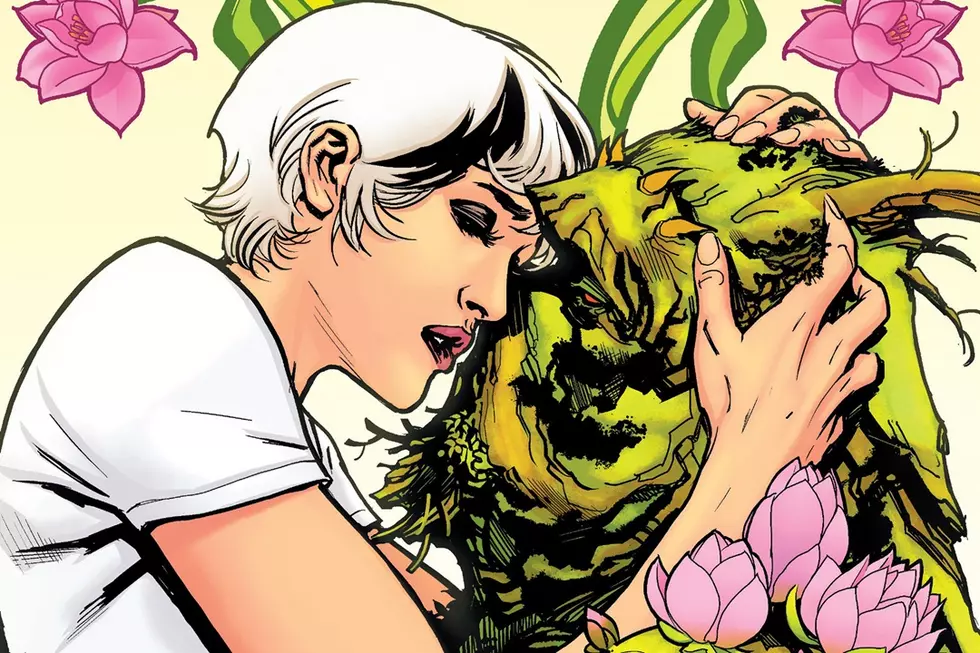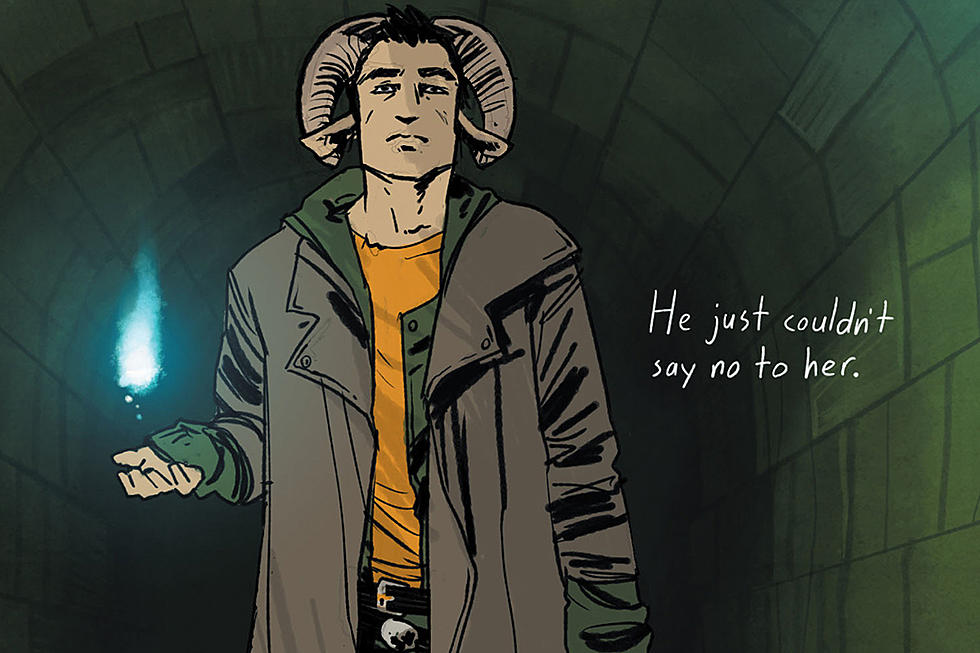
TWIST: Apple Didn’t Ban ‘Saga’ #12 from App Store, ComiXology Never Submitted It

Earlier this week writer Brian K. Vaughan transmitted a press release stating that the latest issue of his and Fiona Staples sci-fi comic Saga would not be available for in-app purchase via ComXology or anything else in Apple's App Store for iOS devices, citing "two postage stamp-sized images of gay sex." Specifically, the artwork depicted graphic oral sex between men, including several ejaculations. While ComicsAlliance chalked the apparent banning up to the App Store's consistently inconsistant policies concerning explicit sexual imagery of any kind -- which were not applied to previous issues of Saga that depicted graphic heterosexual sex -- other outlets and commentators argued the move constituted a distinctly homophobic sentiment on the part of Apple. As such, information proliferated on how to purchase the issue from ComiXology directly, thereby denying Apple its standard commission and awarding more of the purchase price to Vaughan, Staples, their publisher Image Comics, and presumably ComiXology itself.
As it turns out, Vaughan's statement was inaccurate. ComiXology CEO David Steinberger confirmed Wednesday that not only did Apple not ban Saga #12 from sales within its iOS marketplace, ComiXology never actually offered the issue in the first place.

Steinberger's statement from the ComiXology blog:
To our customers -
In the last 24 hours there has been a lot of chatter about Apple banning Saga #12 from our Comics App on the Apple App Store due to depictions of gay sex. This is simply not true, and we'd like to clarify.
As a partner of Apple, we have an obligation to respect its policies for apps and the books offered in apps. Based on our understanding of those policies, we believed that Saga #12 could not be made available in our app, and so we did not release it today.
We did not interpret the content in question as involving any particular sexual orientation, and frankly that would have been a completely irrelevant consideration under any circumstance.
Given this, it should be clear that Apple did not reject Saga #12.
After hearing from Apple this morning, we can say that our interpretation of its policies was mistaken. You'll be glad to know that Saga #12 will be available on our App Store app soon.
We apologize to Saga creator Brian K. Vaughan and Image Comics for any confusion this may have caused.
For his part, Vaughan released a second statement that said:
Yesterday, I was mistakenly led to believe that this issue was solely with Apple, but it's now clear that it was only ever Comixology too conservatively interpreting Apple's rules. I'm truly sorry. I never thought either company was being homophobic, only weirdly inconsistent about what kind of adult material was permissible.
(one of the not-so-offending images, which we had to censor per our content guidelines)

More will be written about this in the coming days, and basically everywhere, for the implications are wide-reaching. On the surface there's the obvious question of how Vaughan came to understand that his and Staples' comic was "banned" or "rejected" or otherwise disapproved of by Apple, and for depictions of "gay sex" specifically.
That ComiXology allowed Apple to take the blame -- and to be branded by many as a homophobic entity -- for 24 hours of passionate blog posts, news articles and high profile tweets (and retweets) before Apple had to step in to defend itself is problematic on a number of levels. By remaining largely silent (and occasionally tweeting with language like "concerned citizens"), ComiXology branded itself as the liberal, sex-positive David to Apple's oppressive, prejudicial Goliath. I've spoken to industry insiders today who wonder what potential harm this bogus narrative may have done to ComiXology's lucrative relationship with Apple, a company with a gay CEO and an extremely high rating by the Human Rights Campaign, a company that offered the offending Saga issue in its own iBooks store without any fuss, and a company that seems to have had to approach ComiXology directly to correct the record.
Staples put it bluntly in a tweet:
Comixology never stopped us from blaming Apple until this morning's statement.
In the wake of Steiberger's statement, several comics creators and industry commentators who criticized the company as homophobic have tweeted apologies to Apple.
The other major surface-level question is one of money. While sales figures are unavailable to us, we can safely assume from the media (both social and news) activity of the last 24 hours that casting Apple as a prude or even homophobic villain drove Saga readers -- who are plentiful -- away from in-app ComiXology purchases and towards ComiXology's web-based stores, where Apple is not entitled to a 30% commission. As has been testified by numerous creators, buying digital comics from the ComiXology Web store or its branded publisher Web stores, while arguably less convenient than doing so within the iOS apps, increases the profit margins for creators and publishers, and we assume ComiXology as well. It's extremely likely that these events are the consequence of the bad call Steiberger referenced and not any kind of malice, but by not submitting Saga #12 to Apple at all and by not stepping in with the facts much sooner, ComiXology has created a situation where its motives have been questioned.
(Apple never reviewed this image, which we pixelated, of several men ejaculating on another man's face)
Beneath the surface of the Saga fiasco lies the more important questions for the digital comics scene going forward: who are the gatekeepers, and what do they care about? In my experience in digital media, guidelines with respect to sexual content are extremely strict not so much because of morality but because of liability. Retailers, television networks, websites and application developers care less about sex or anything having to do with human anatomy (except for violence, of course) than they do about somebody's parents flipping out and suing them, so consequently anything "flagged" on sites like Facebook or apps like Instagram or content websites or products in digital marketplaces like Apple's App Store is zapped just as a matter of course -- often without even inspecting the offending material to make sure it's in violation of anything! C.Y.A. is the order of the day.
But that's not a tenable position anymore; certainly not as Apple's app stores become the most populated and influential digital marketplaces on Earth, where adult consumers demand access to the same kinds of material they've been trusted to purchase in the analog world since ancient times. So guidelines have to become more flexible. We've seen it evidence of it. Previous issues of Saga, which have featured a woman giving birth, complete with umbilical cord biting and breastfeeding; aliens with televisions for heads going at it "doggy style"; and visible heterosexual penetration have passed through the halls of Apple's app store without incident. But we also know that some comics haven't, and that some of those were accepted eventually.
Content creators and consumers want to see explicit rules as to what is and is not permissible in the iOS marketplace, and the current language in Apple's Terms of Service is vague:
Apps containing pornographic material, defined by Webster's Dictionary as "explicit descriptions or displays of sexual organs or activities intended to stimulate erotic rather than aesthetic or emotional feelings", will be rejected
It should be noted that in-app purchases like comics are reviewed by Apple on a case by case basis.
ComiXology offers even less helpful guidelines for those seeking to sell their independently created comics via its Submit platform:
The approval process is a work in progress. First and foremost, we want to maintain a level of professional content that comiXology users have come to expect from our platform. What the definition of professional content is will certainly be something that we refine as we progress into this brave new world.
The situation inspired the Thrillbent digital comics publisher Mark Waid to reread the language in the agreement he signed with ComiXology:
Hey, look. There, under the qualifiers defining what material cannot be published through apps but only through the web, is this one: "Explicit pornographic depiction of sexual activity or genitalia." Okay, call me an old biddy, but I could make a reasonable case that an illustration of gang-bang bukkake could be interpreted as "explicitly pornographic."
I think most people would agree with Mark Waid with respect to space bukkake. And yet, Saga #12 was accepted by Apple when they finally got a look at it. As I said above, the standards applied to this kind of material are consistently inconsistent, and this will remain a problem for digital comics as long as the current curator-based system is in place.
But the Saga #12 situation complicates that gatekeeper question in a profound way, because it's confirmed that ComiXology has changed its position from that of a pure retailer to a kind of content curator. To wit, we can infer that someone at ComiXology judged that graphic heterosexual intercourse in an earlier issue of Saga would meet with Apple's approval, but that graphic oral sex between men would not. There are many possible implications built into that decision, but the ultimate result was that ComiXology was wrong and the company's second-guessing of Apple's admittedly oblique guidelines tipped the first domino in this embarrassing and painful story.
The questions raised in the discussion of this situation matter because of just how successful ComiXology has become. In the realm of digital comics -- the realm that many smart people believe is to be American comics' sales salvation -- ComiXology is the undeniable industry leader. ComiXology is the digital equivalent of Diamond Comic Distributors, the print wholesaler behind the vast majority of comic book store business around the world. And like Diamond, how ComiXology chooses to operate will define its increasingly important dimension of the comic book industry.
More From ComicsAlliance





![The Blossom Twins And Pete Woods Wreak Havoc On Riverdale In ‘Archie’ #18 [Interview]](http://townsquare.media/site/622/files/2017/03/Archie00.jpg?w=980&q=75)
![Comics’ Sexiest Female Characters (From A Queer Perspective) [Love & Sex Week]](http://townsquare.media/site/622/files/2017/02/hg_featured.jpg?w=980&q=75)


